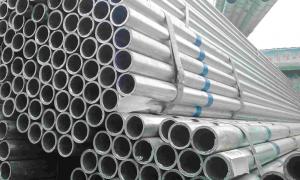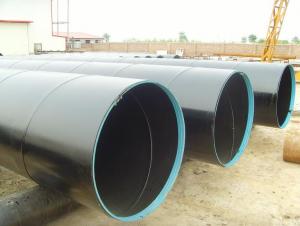Seamless steel tube API,GB,ASTM,ASME,DIN
- Loading Port:
- Tianjin
- Payment Terms:
- TT OR LC
- Min Order Qty:
- 10 m.t.
- Supply Capability:
- 5000 m.t./month
OKorder Service Pledge
OKorder Financial Service
You Might Also Like
1. Commodity Name: Seamless steel pipe
2. Standard: API,GB,ASTM,ASME,DIN
3. Quality grade: 10#, 20#, A106B, A53B, API 5L B, Q235, Q345, ST37-2, ST 45, ST52.etc.
4. Dimension:
OD: 1/2"-24"
WT: 2.5-80mm, SCH10~SCH40~XXL
length: 5.8m,6m,8m,9m,12m
5. Technique: Hot Rolled/Cold Rolled/ Cold Drawn
6. application
carbon seamless steel pipes are widely used in gas, water and oil, transpotation;constructions;Bridge,highway,windows of model steel door; building materials;fences;heating facilities Fluid Pipe;conduit pipe,scaffolding pipe.etc.
7. Payment Terms: L/C D/A D/P T/T
8.packing and shipment
Packaged in bundles,as per customers' requirements, it can also bepackagesd as beveled ends, typed marking, black painting, plastic caps protection,woven bags packing
For 20" container the max length is 5.8m; For 40" container the max length is 12m. other options are available based on customer requests. Please discuss when placing orders.
9. Surface: painted with varnish;
10. Plastic caps at ends.
11. Tolerance: OD +1%/-1%
WT +12.5%/-10%
12. Chemical composition:
Models of Steel Pipes | Chemical Component | |||||||
Steel 20 (ASTM A106B) | C | Si | Mn | P | S | Cu | Ni | Cr |
0.17~0.24 | 0.17~0.37 | 0.35~0.65 | 0.035max | 0.035max | 0.25max | 0.25max | 0.25max | |
Steel45 (ASTM 1045) | 0.42~0.50 | 0.17~0.37 | 0.50~0.80 | 0.035max | 0.035max | 0.25max | 0.25max | 0.25max |
16Mn(Q345B) | 0.12~0.20 | 0.20~0.55 | 1.20~1.60 | 0.035max | 0.035max | 0.25max | 0.25max | 0.25max |
45Mn2 ( ASTM1345) | 0.42~0.49 | 0.17~0.37 | 1.40~1.80 | 0.035max | 0.035max | 0.3max | 0.3max | 0.30max |
- Q:What are the advantages of using steel pipes in the manufacturing industry?
- There are several advantages of using steel pipes in the manufacturing industry. Firstly, steel pipes are known for their strength and durability, making them suitable for handling heavy loads and withstanding high pressures. Secondly, steel pipes have excellent corrosion resistance, which ensures a longer lifespan and reduces the need for frequent replacements. Additionally, steel pipes offer a smooth interior surface, allowing for efficient fluid flow and minimizing friction losses. They are also highly versatile, as they can be easily fabricated and customized to meet specific requirements. Finally, steel pipes are environmentally friendly, as they are recyclable and contribute to sustainable manufacturing practices.
- Q:What are the factors to consider while selecting steel pipes for a project?
- When choosing steel pipes for a project, there are several key factors to take into account. These factors encompass the material composition of the steel, the dimensions of the pipes, the intended use, the environmental conditions, and the allocated budget. Firstly, the material composition of the steel pipes plays a vital role in determining their strength, resistance to corrosion, and overall durability. Carbon steel, stainless steel, and alloy steel are commonly used types of steel for pipes, each possessing unique characteristics suitable for different applications. Secondly, the dimensions of the pipes, including diameter and wall thickness, should be carefully considered. It is crucial to ensure that these dimensions align with the project requirements and the system in which the pipes will be installed. This ensures that the selected pipes can effectively handle the required flow rates and pressures. Thirdly, thorough assessment of the intended application of the steel pipes is necessary. Different projects may demand pipes with specific features, such as heat resistance, pressure resistance, or the ability to transport particular substances like gas, oil, or water. Understanding these application requirements aids in selecting the appropriate type of steel pipes. Evaluation of the environmental conditions in which the pipes will be installed is also important. Factors such as temperature fluctuations, exposure to moisture, corrosive substances, and external pressures must be taken into account. For example, if the project involves underground installation or exposure to corrosive chemicals, corrosion-resistant steel pipes may be necessary. Lastly, the allocated budget for the project is a significant consideration. The cost of steel pipes can vary depending on their material composition, dimensions, and additional features. Striking a balance between project requirements and available budget ensures cost-effectiveness without compromising the quality and performance of the pipes. In conclusion, the selection of steel pipes for a project necessitates careful consideration of factors including material composition, pipe dimensions, intended application, environmental conditions, and budget. By thoroughly evaluating these factors, one can choose the most suitable steel pipes that meet project requirements, ensuring long-term performance and durability.
- Q:304 stainless steel tube with the diameter of 25*2-3 is what mean
- The quality of the steel pipe should be in line with the national standard "stainless steel seamless pipe for fluid transportation" (GBT 14976-2012) requirements.
- Q:Can steel pipes be used for bridge piling?
- Yes, steel pipes can be used for bridge piling. Steel pipes are commonly used in bridge construction due to their strength, durability, and resistance to corrosion. They provide sufficient load-bearing capacity and can be driven deep into the ground to provide stable support for bridges.
- Q:What are the different grades of steel pipes?
- There are several different grades of steel pipes, including carbon steel, stainless steel, and alloy steel. Each grade has its own unique properties and is used for specific applications based on factors such as strength, corrosion resistance, and temperature resistance.
- Q:How are steel pipes used in the manufacturing of storage tanks?
- Steel pipes are commonly used in the manufacturing of storage tanks as they provide structural strength and durability. These pipes are used to create the framework or skeleton of the tank, providing support and stability to hold large volumes of liquid or gas. Additionally, steel pipes are often used for the inlet and outlet connections, as well as for internal piping systems that allow for the transportation of substances within the tank. Overall, steel pipes play a crucial role in ensuring the integrity and functionality of storage tanks in various industries.
- Q:When can I use the PVC pipe and when to use the galvanized pipe?
- Galvanized pipes are generally used outside the drying environment or building blocks, and PVC is mainly used for pre embedding in walls or humid environments. If in the ceiling ceiling, below the roof, you need to use galvanized pipe, in the floor below, on the ground you need to use PVC.
- Q:Are steel pipes suitable for industrial applications?
- Yes, steel pipes are highly suitable for industrial applications. Steel pipes possess excellent strength, durability, and corrosion resistance, making them ideal for transporting fluids, gases, and solid materials in various industries such as oil and gas, construction, automotive, and manufacturing. Additionally, steel pipes can withstand high pressure, extreme temperatures, and harsh environmental conditions, making them reliable and efficient for industrial operations.
- Q:What is the role of steel pipes in the transportation of chemicals?
- The role of steel pipes in the transportation of chemicals is to provide a safe and reliable means of transporting various types of chemicals over long distances. Steel pipes are highly resistant to corrosion, which is crucial when dealing with corrosive chemicals. They are also strong and durable, ensuring that the pipes can withstand the pressure and weight of the chemicals being transported. Additionally, steel pipes are able to maintain the integrity of the chemicals, preventing any leakage or contamination during transportation. Overall, steel pipes play a vital role in ensuring the efficient and secure transportation of chemicals.
- Q:What is the difference between steel pipes and plastic pipes?
- The main difference between steel pipes and plastic pipes lies in their material composition. Steel pipes are made from a durable and strong metal alloy, while plastic pipes are composed of various types of plastic polymers. This difference in materials leads to variations in their properties and usage. Steel pipes are known for their high strength, resistance to extreme temperatures and pressures, and longevity, making them suitable for applications requiring robustness, such as in industrial settings or underground pipelines. On the other hand, plastic pipes are lightweight, flexible, and corrosion-resistant, making them ideal for plumbing, irrigation, and other non-industrial applications. Additionally, plastic pipes are easier to install and handle due to their lighter weight and flexibility compared to steel pipes.
1. Manufacturer Overview |
|
|---|---|
| Location | |
| Year Established | |
| Annual Output Value | |
| Main Markets | |
| Company Certifications | |
2. Manufacturer Certificates |
|
|---|---|
| a) Certification Name | |
| Range | |
| Reference | |
| Validity Period | |
3. Manufacturer Capability |
|
|---|---|
| a)Trade Capacity | |
| Nearest Port | |
| Export Percentage | |
| No.of Employees in Trade Department | |
| Language Spoken: | |
| b)Factory Information | |
| Factory Size: | |
| No. of Production Lines | |
| Contract Manufacturing | |
| Product Price Range | |
Send your message to us
Seamless steel tube API,GB,ASTM,ASME,DIN
- Loading Port:
- Tianjin
- Payment Terms:
- TT OR LC
- Min Order Qty:
- 10 m.t.
- Supply Capability:
- 5000 m.t./month
OKorder Service Pledge
OKorder Financial Service
Similar products
New products
Hot products
Hot Searches
Related keywords





























